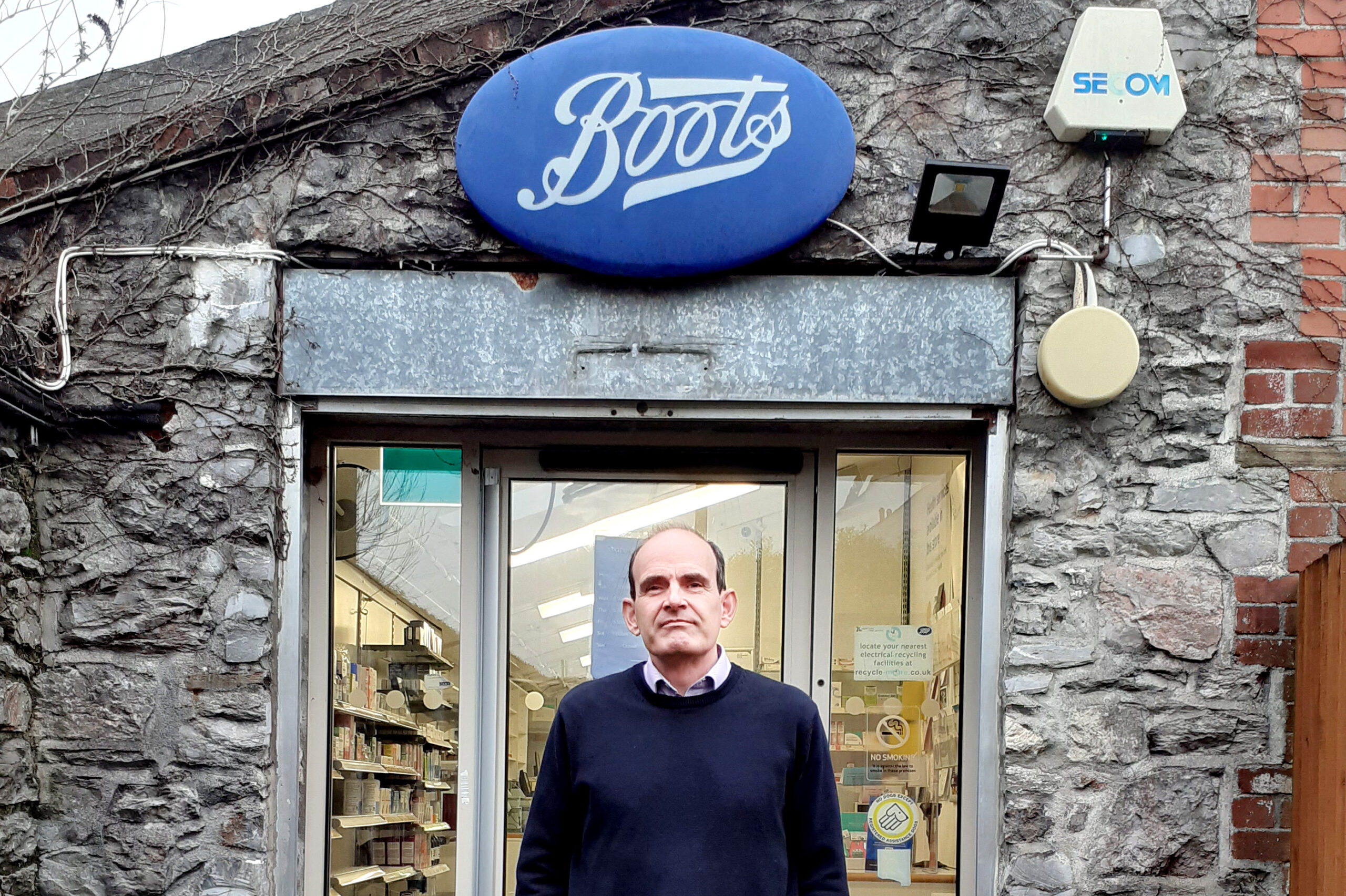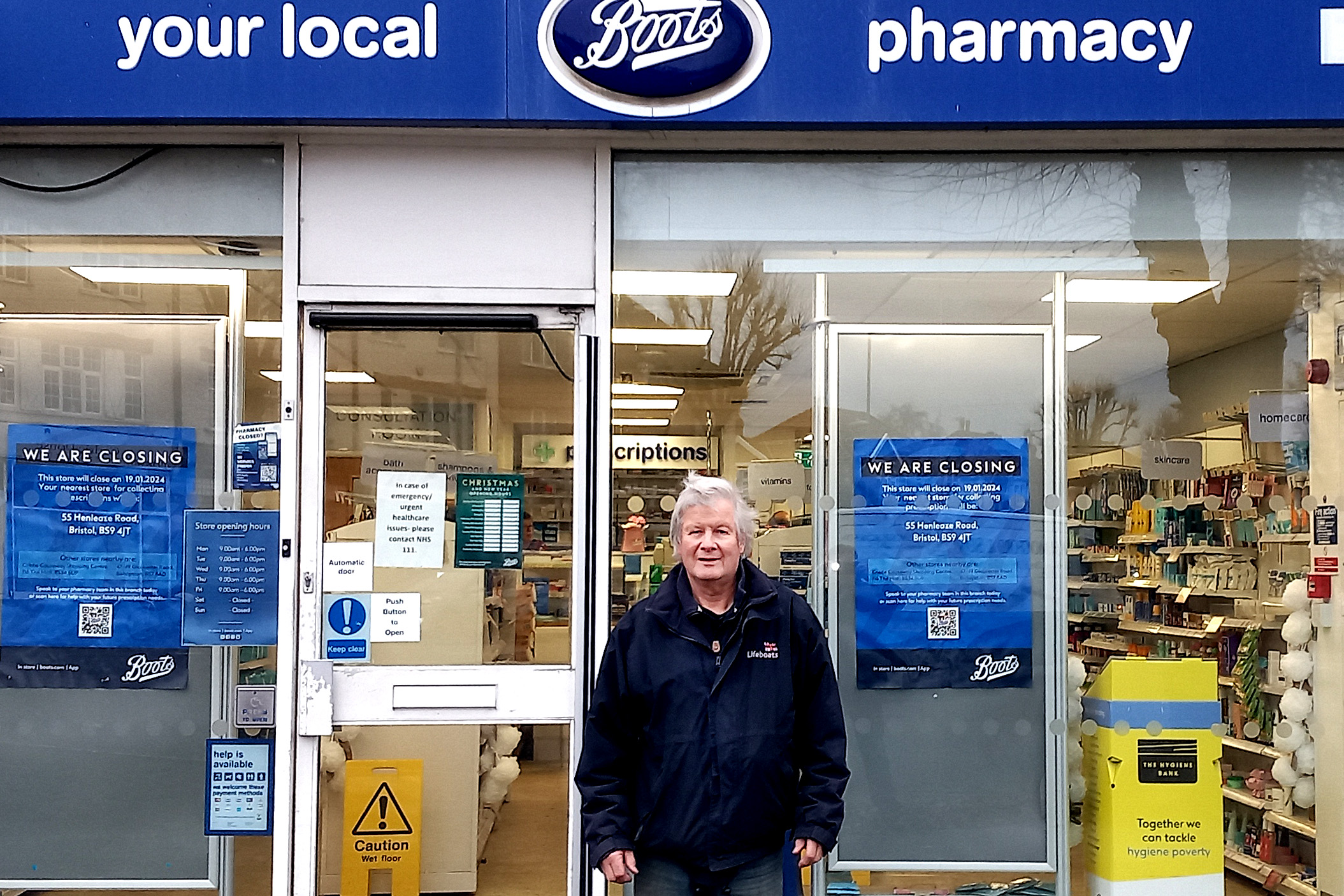
Wes Mountain/The Pharmaceutical Journal
“Without immediate action to protect the community pharmacy network, patients in deprived neighbourhoods risk being left high and dry,” warned Malcolm Harrison, chief executive of the Company Chemists’ Association (CCA), in November 2023[1].
His stark words were in response to an analysis by the CCA, which revealed there had been a net loss of 1,008 pharmacies in England between 2015 and 2023. Of these closures, 37.5% occurred in neighbourhoods rated as the most deprived 20% in the country by the UK government’s most recent English Indices of Deprivation, which measures deprivation in domains including health, income, education and housing.
Flat funding since 2017/2018, without inflationary increases, as well as workforce shortages, mean the community pharmacy network has become increasingly fragile.
We have already seen pharmacies up and down the country being forced to close temporarily
Janet Morrison, chief executive of Community Pharmacy England
“We have already seen pharmacies up and down the country being forced to close temporarily, making reductions in opening hours where they can, reviewing their estates, and, if they can, closing branches,” said Janet Morrison, chief executive of Community Pharmacy England, in a statement in November 2023.
Boots first announced plans for 200 store closures back in 2019, as part of a ‘transformational cost management programme’, with a further announcement in June 2023 that an additional 300 pharmacies would close.
Local and national news outlets have reported a deluge of petitions, protests and appeals from councillors and MPs by people desperate to keep their local pharmacies open.
Protesters have been buoyed by successful campaigns, such as a Boots store in Farncombe, Surrey, which stayed open following an online and paper petition with more than 2,200 supporters in total, and intervention from Jeremy Hunt, Conservative MP for South West Surrey. In a Facebook post on 27 September 2023, Hunt said that he was delighted to hear the “fantastic news” that the pharmacy is staying open: “I have spoken to the CEO of Boots twice in the past weeks, supporting the brilliant community pharmacy campaign … which has really shown the strength of feeling in the local area.”
However, some campaigns have not been so successful, such as Boots in Glastonbury High Street, Somerset, which closed on 13 December 2023, despite protests and an online petition with 468 signatures. It was a double blow for the community, following the closure of Glastonbury’s Tesco pharmacy in August 2023.
Communities in the south west of England have been hit particularly hard by closures (see figure). The area is facing pharmacy workforce shortages and an analysis of local news reports since October 2023 by The Pharmaceutical Journal revealed residents are particularly vocal about the issue, with reports of petitions, protests and appeals from councillors and MPs in areas including Portsmouth, Exeter, Kingsteignton, Weston-Super-Mare, St Austell, Plymouth, Bristol, Portland, Glastonbury, Sidmouth and Swindon.
The Pharmaceutical Journal spoke to patients, local politicians and clinicians in three areas in the south west of England to find out why they are fighting to keep pharmacy doors open.
Isle of Portland, Dorset
A pharmacy has served the local community in Underhill on the Isle of Portland for more than 100 years.
A few times each month, Carralyn Parkes, the mayor of Portland, walks three minutes from her front door to the pharmacy to pick up prescriptions for herself and her husband.

As a couple in their 60s, both with long-term health conditions, the Boots pharmacy provides them with an essential service.
“We’re not spring chickens anymore,” Parkes tells The Pharmaceutical Journal. “I have hypertension and asthma. My husband has myasthenia gravis, which is a neurological illness. He gets literally a shopping bag full of medications.”
But the pharmacy has been earmarked to shut in January 2024, as part of Boots’ plans to consolidate stores in close proximity — a closure which Parkes fears will have a “tremendous effect” on her life and that of her fellow residents.
Closing this pharmacy is a real human tragedy, not just for our community, but for the future of Underhill
Carralyn Parkes, mayor of Portland, Dorset
“There are lots of people who are in the same situation as we are,” she says. “Closing this pharmacy is a real human tragedy, not just for our community, but for the future of Underhill.”
The closure would leave just one pharmacy for Portland’s 13,417 residents. The other pharmacy is at Easton Square in Tophill. Although only 1.5 miles away, it is a steep uphill walk, making it a daunting trip for people with illness or disabilities.
“Tophill is literally built into the hill,” explains Parkes, who has lived on the island for 25 years. “It requires you to climb a hill that is really steep.”
She adds that Portland has a large elderly population and a low car ownership rate.
“If somebody can’t walk to the pharmacy in Tophill, they would have to pay £2 on the bus to get there and £2 to get back, on top of whatever they’re going to have to pay for their medications,” she continues.
Parkes has invited Sebastian James, senior vice president and managing director of Boots, to walk with her to the Tophill pharmacy to demonstrate how steep the walk is.
An email response from James, seen by The Pharmaceutical Journal, says: “We recognise that you are disappointed, but the decision has not been taken lightly. After the closure, local residents will be able to access pharmacy services at nearby Boots stores, including the branch at Easton Square which is 1.5 miles away.”
Parkes remains hopeful that James will join her for a walk, and that it is not too late to prevent the closure. A petition to save the pharmacy was launched in October 2023, and has gained 1,318 signatures as of 3 January 2024.
“This community desperately needs this facility. It’s not just about prescription medications, it’s about the health advice that’s given, it’s about vaccinations — all of the things that go into a community pharmacy.
“It’s a really integral part of our community and it’s shocking to think it can just be torn away,” she adds.
Plymouth, Devon
Andrew Potter has been a GP partner at North Road West Medical Centre in Plymouth for the past 27 years.

Andrew Potter
Since 1997, staff at the practice have had a strong relationship with the adjoining Boots pharmacy on Claremont Street, but the branch has been earmarked for closure in January 2024, alongside five other Boots stores in Plymouth that have either already closed or will do so in early 2024.
Potter tells The Pharmaceutical Journal that around 4,000–4,500 of the surgery’s 9,300 patients will need to change pharmacy because of the closure.
The surgery sits in one of the most deprived areas of England, according to the government’s English Indices of Deprivation.
Our patients are in an area of deprivation in Plymouth so everything that makes their lives harder is more keenly felt
Andrew Potter, GP partner at North Road West Medical Centre, Plymouth
“Our patients are in an area of deprivation in Plymouth so everything that makes their lives harder is more keenly felt. They have poorer health, less access to transport and personal networks that are less well equipped to help out,” Potter explains.
“Patients are concerned they won’t receive the responsive service they’ve experienced in recent years. Other pharmacies in the area are already busy.”
He adds that staff at the practice have found the relationship with the pharmacy of “practical mutual value” over the years.
“Up until now, we’ve been able to use our neighbouring pharmacy as a resource during duty surgeries so that urgent medications, such as antibiotics and steroids, can be instantly sourced right up to closing time.
“We are always calling to ask what stock is available so that our prescriptions are not sent back. This saves GP and pharmacy time, aside from the efficiency gain for the patient.”
Potter adds that he prescribes opiate substitute treatment alongside the local drugs and alcohol service. “The ability to be able to quickly check with [the Boots] pharmacist to see how the patient is presenting is a reassurance,” he says.
He fears that the closure of other pharmacies in Plymouth will also have a “knock-on effect of reduced overall capacity in the city”.
Going forward, Potter would like to see deprivation factored into pharmacy contracts, something he believes could happen with “political will”.
“We would like to see community pharmacy recognised as part of the fabric of society and the fabric needs to be especially strong in more deprived areas,” he says.
Mary Aspinall, cabinet member for health and adult social care at Plymouth City Council, says she has been contacted both by residents, who are concerned about pharmacy closures, and adult social care providers, who are concerned about the impact on the people they support.
This is an additional barrier that will make it much more difficult for [patients] to access healthcare, which could widen health inequalities
Mary Aspinall, cabinet member for health and adult social care at Plymouth City Council
She says the closures are a further blow for local people who have already been “hit hard” by the cost-of-living crisis.
“This is an additional barrier that will make it much more difficult for them to access healthcare, which could widen health inequalities,” she tells The Pharmaceutical Journal.
“The whole healthcare system is under immense pressure, and we shouldn’t underestimate the role that pharmacies play by being a first point-of-call when people have minor ailments. For many, that service will no longer be available on their doorstep,” she adds.
Aspinall is writing to Andrea Leadsom, health minister, to convey residents’ concerns and ask her to intervene in preventing pharmacy closures.
Southmead and Hartcliffe, Bristol
Two Boots pharmacies are planned for closure in Bristol’s most deprived suburbs: Southmead and Hartcliffe.
Neil Goldsmith, a retired data centre relocation specialist, is one of more than 800 residents who have signed a petition to keep the pharmacy in Southmead Road, Bristol, open.

Neil Goldsmith
He requires regular prescriptions for statins and blood pressure medicines, plus his partner and stepson take regular medicines.
Until now, the family have easily walked five minutes to Boots at the top of their road, but it takes around 15 minutes more to get to the next pharmacy, which Goldsmith says is often busy, with long queues.
We’ve known the pharmacist for around ten years and if somebody knows you, they can give you a better service
Neil Goldsmith, retired data centre relocation specialist
One of his concerns is that the pharmacists in larger stores will not know their customers as well. “Because a number of us are of a similar vintage, we appreciate the local, friendly approach and the customer knowledge in the small branch.
“We’ve known the pharmacist for around ten years and if somebody knows you, they can give you a better service. You build up a relationship and they get to know your circumstances and your requirements,” he adds.
Steve Smith, Conservative councillor for Westbury-on-Trym and Henleaze, told The Pharmaceutical Journal that residents were afraid it would be difficult to access another pharmacy when the Southmead Boots closes.
“The next nearest pharmacy is always overcrowded and already has queues out on the pavement most days,” he says.
“It’s not like going to the corner shop for a pint of milk. These provide essential medication and services that people rely upon and a lot of residents are genuinely worried and upset about what they’re going to do when this branch isn’t here anymore,” adds Smith.
The way forward
Sue Taylor, chief officer at Community Pharmacy Devon, tells The Pharmaceutical Journal that, in addition to “ongoing financial and operational pressures”, the south west of England has difficulties with “pharmacy workforce in terms of recruitment and retention, which adds to the pressures and costs” that lead to pharmacy closures.
NHS England’s 2022 ‘Community pharmacy workforce survey’ revealed the south west of England has the highest level of community workforce shortages in the country.
Somerset Integrated Care System (ICS) had the highest vacancy rate for community pharmacist roles in the country, with 32% (77 of 237) of full-time equivalent positions unfilled, including locum and relief pharmacists. Bath and North East Somerset, Swindon and Wiltshire ICS had a vacancy rate of 25% (72 of 284) and Devon ICS’s vacancy rate was 20% (84 of 418).
One possible glimmer of hope comes from the University of Plymouth, which will be jointly running the University of Bath’s MPharm course from September 2024, as part of a drive to cut pharmacist workforce shortages in the south west.
The news about the new Pharmacy First service, the relaunched hypertension case finding service and provision of oral contraception as part of the £645m recovery plan is very welcome and will bring some relief
Sue Taylor, chief officer at Community Pharmacy Devon
Taylor also says that commissioners are working with owners who are closing their pharmacies “to ensure that there are robust plans in place to support patients through the process”.
She adds that the local pharmaceutical committee is optimistic that the £645m of funding that the government will invest in community pharmacy over the next two years will “help build and support a robust network of pharmacies and be the key entry point for primary care”.
“The news about the new Pharmacy First service, the relaunched hypertension case finding service and provision of oral contraception as part of the £645m recovery plan is very welcome and will bring some relief, and we are working with the ICB [integrated care board], contractors, public health teams and the local authorities to examine the risks and opportunities, to alleviate the risks,” Taylor says.
She adds that “robust plans” are being instigated to support pharmacy teams in Devon, which will be supported by “improved technological solutions”.
“In Devon, there is a working party being established to respond using a number of mechanisms, such as expanding the usage of electronic repeat dispensing, maximising nationally commissioned services uptake and delivery, building on integration of community pharmacy within the wider primary care network and making the best use of the Pharmaceutical Needs Assessment (PNA) framework,” she explains.
Applications for new pharmacies can only be made in response to a gap in pharmacy services identified in the PNA.
NHS Dorset ICB, One Devon ICB and NHS Bristol, North Somerset and South Gloucestershire ICB all tell The Pharmaceutical Journal that health and wellbeing boards, run by local authorities, are responsible for producing PNAs, which consider the provision needed for a local population.
NHS Dorset ICB adds that it is working with Community Pharmacy Dorset “to address pharmacy workforce challenges”, which includes “developing Pharmacy First services and a pharmacy pathfinder project to develop independent prescribers”.
A spokesperson for Boots said the company would not comment on closures in individual areas. In a statement, Boots said that its consolidation plans were intended to “concentrate its team members where they are needed and focus investment more acutely in individual stores with the ambition of consistently delivering an excellent and reliable service in a fresh and up to date environment”.
With the funding injection and introduction of Pharmacy First, there may be hope for the future of the community pharmacy network in the south west of England, but this has not been enough to stop the current wave of closures. In the meantime, residents continue to fight to maintain access to vital local services.
- 1Company Chemists Association. The impact of pharmacy closure on health inequalities: one year on. Company Chemists Association. 2023. https://thecca.org.uk/wp-content/uploads/2023/11/Impact-of-pharmacy-closures-on-health-inequalities-one-year-on.pdf (accessed 4 January 2024)


